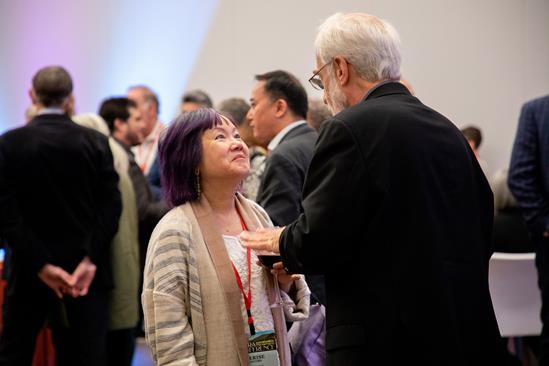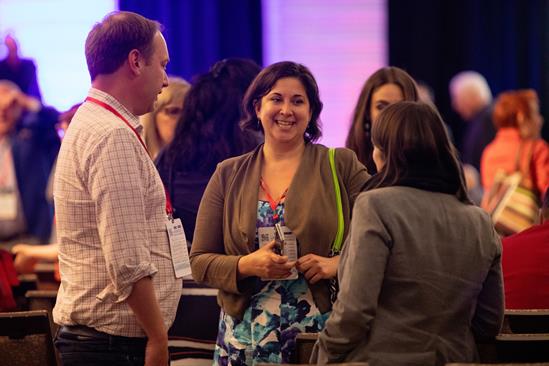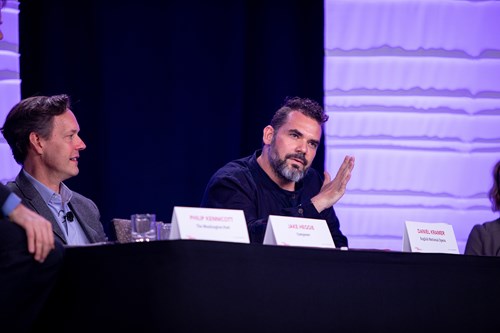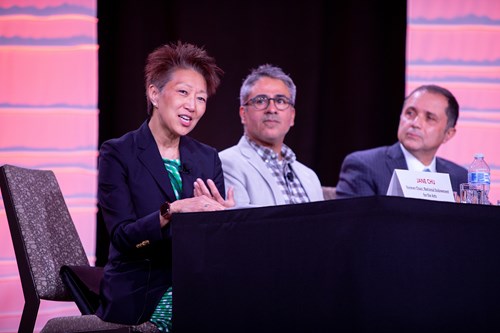Conference Crosscurrents
The Opera Conferences of recent years have each been organized around a single overarching theme. This year’s outing marked a change of course. Opera Conference 2019, held in San Francisco from June 12 to 16, offered three thematic tent poles — “Examining Traditions,” “Exploring Business Innovation,” and “Deepening Civic Practice” — each introduced at a general session, where speakers offered “provocations” about the theme, with smaller subsequent discussions exploring the topics further. It soon became clear that none of the themes could be isolated from the other two. Any discussion of business innovation, for instance, will necessarily encompass the manner in which the field and its practitioners approach the heritage of opera, along with companies’ roles as civic practitioners.


Over the four days, a record-setting 700 attendees explored these broad themes, while also diving into topics tailored to the various professions within the opera field. With San Francisco Opera as the host of the conference, attendees had the chance to take in three mainstage productions — Carmen, Rusalka and Orlando — as well as a preview of Merola Opera Program’s first-ever commission, If I Were You by Jake Heggie and Gene Scheer. The conference also provided numerous opportunities for social gatherings, the highlight of which was the Host Company Reception at SFO’s Wilsey Center, where attendees could experience a demonstration of Meyer Sound’s Constellation acoustic system, which allows the Center’s performance hall to take on a range of acoustic environments.
To view select sessions from the conference, visit OPERA America’s YouTube channel. Next year’s conference, OA’s 50th, will take place May 13 to 16 in Seattle, with Seattle Opera as host company.
Exploring Business Innovation
“What percentage of your company’s energy and output is devoted to your large-scale productions?” asked Roger Weitz, general director of Omaha Opera. “What percentage of your company’s annual budget is supported by ticket sales to those performances?” Weitz’s questions, addressed to attendees of the June 14 “Exploring Business Innovation” general session, proposed that opera companies broaden their range of focus in defining their operations, looking at themselves not simply as purveyors of opera productions, but as civic resources, serving their communities through activities both on and off the stage.
The afternoon’s explicit focus was on business practices. The breakout sessions that followed the general session addressed issues like collective-bargaining tactics and audience-building strategies; Matthew Shilvock, San Francisco Opera’s general director, led a session on his company’s new strategic framework. But inevitably, the discussions raised topics encompassing the full range of opera’s operations, from repertoire and production choices to education and community engagement.
The discussions encouraged opera professionals to address the idea of innovation itself. In some ways, the field’s measured rate of change may be tied in with its self-definition: After all, the industry expends a good proportion of its resources to maintain an ingrained repertory of standard works. Annie Burridge, general director and CEO of Austin Opera, observed that the field’s “core value is not innovation; it’s preservation.” Alexis Gonzalez-Black, an organizational-change professional with the consulting firm August Public, suggested that, given the inherent structural difficulties of amending ingrained practices, the best tactic is to stress “incrementalism” over “transformation.” Whatever strategy the field pursues, though, the sessions highlighted the real need to look at present practices and make informed decisions about how innovation can be applied.
“Becoming an agile organization is deep, valuable work that impacts every part of the operating model,” Gonzales-Black said. “It starts with the courage to try and fail — to take the heat, and learn your way forward.”
PROVOCATIONS:
Matthew Shilvock
General Director, San Francisco Opera
“Innovation is an act of creativity, and it needs to have a playfulness and ephemerality to it, staying flexible, learning, adapting and pivoting. That kind of playfulness can be anathema to opera companies for which perfection is often an ideal. We need to think of ourselves as creative companies, not just companies with creative products.”
Roger Weitz
General Director, Opera Omaha
“For a field that is both reliant on philanthropy and often accused of being irrelevant, should we not focus more energy on serving those who can’t afford or choose not to attend our large-scale productions? What innovations might be possible if we thought of ourselves as cultural resources for our communities rather than just opera companies?”
Examining Traditions
Claude Debussy once noted that his ability to innovate came from his knowledge of musical tradition. His pronouncement might have served as a starting point for “Examining Traditions,” the first of Opera Conference 2019’s three plenary sessions. The Washington Post’s Philip Kennicott, the event’s moderator, led off with the observation that the tension between tradition and innovation wasn’t just about aesthetic preference, but also a matter of financial and civic responsibility. Kennicott focused on audiences, asking panel participants, “How do we make opera relevant to communities? What is the value of a core tradition?” Panelists responded in myriad ways, ranging from what 50 years ago might have been considered heretical — producer Beth Morrison suggested axing Die Entführung aus dem Serail from the canon — to director/administrator Daniel Kramer’s proposal to cut and rearrange canonic staples.
An opera company’s audience, and the community from which that audience is drawn, is key in considering the role of tradition in its programming. Timothy O’Leary’s audience (Washington National Opera) is going to be different than Nicole Paiement’s audience (Opera Parallèle). Matthew Shilvock, the general director of San Francisco Opera, said that an examination of tradition involves an understanding of audience expectations, and the necessity in maintaining that audience’s trust. In his company’s case, he said, this takes the form of respecting expectations around a small body of works, and then being “really thoughtful and diverse when looking at the rest of the repertoire.” From the perspective of Elise Brunelle from Cape Town Opera, balancing innovation and tradition means respecting the needs of a community of emerging and early-career singers. “What we choose to do is very singer-driven,” she explained, describing partnerships with the University of Cape Town Opera School. Beth Morrison argued that working against tradition is a form of civic duty. Kramer for his part warned that tradition should not be a set of blinders preventing companies from “shattering expectations.” —Megan Steigerwald Ille
PROVOCATIONS

Nicole Paiement
Founder and Artistic Director, Opera Parellèle
“It is the reinvention of this genre over centuries that has kept opera vibrant. We all realize that institutions will not maintain their leadership by relying solely on mounting works from the past. However, the inherited repertoire creates continuity and guides us as we continue to renew the form and develop works that are linked to the world we live in.”
Elise Brunelle
Managing Director, Cape Town Opera
“In South Africa, performing the classics is crucial to the training and emergence of young operatic singers. The question is not so much that inherited repertoire no longer has a place in Africa, but rather, how do we adapt it to suit our voices and audiences?”
Jake Heggie
Composer
“Forward is the only way it goes. Most of what was very precious to a generation is left behind by the next. That’s part of the natural cycle. What gets us into real trouble is when we try to stop that growth and evolution because we love it too much to let it go”
Deepening Civic Practice
Nobody at Opera Conference 2019 questioned the need for strengthening the field’s commitment to civic action. The discussions at the general session “Deepening Civic Practice” (moderated by former NEA chairman Jane Chu) and the breakout sessions that followed centered on strategy. Companies have to work to bring opera to audiences who have historically felt uninvited, and they have to find ways to increase diversity on their staffs and boards. It’s not merely a matter of doing the right thing.
The conference celebrated examples of progress, spread across companies large and small. At Anchorage Opera, changes in programming since 2015 have opened the company’s doors to Latino, Asian, indigenous, transgender and veteran audiences in ways that have been transformational. At Pacific Opera Victoria, a capital project to build a rehearsal hall transformed into a project to create a community gathering space — re-centralizing the company’s role as not simply a purveyor of performances, but a community resource. At San Francisco Opera, an OA Innovation Grant seeded projects aimed at creating sustainable connections between the opera season and one of the city’s most pressing issues, homelessness.
The process of navigating away from ingrained procedures toward a new civic-forward practice is rarely without complication. Still, the conference highlighted the growing community of support across the field: individuals and organizations that are willing to share their experience and perspective to help others address this vital topic. The implicit message was that, through the lens of shared experiences, the field can become stronger and more effective, and of greater benefit to the communities it serves.
PROVOCATIONS

Mark Valdez
Consultant, ArtsValdez
“Civic practice is a form of artistic expression. It has its own aesthetic. It is art. Until artistic directors and general managers understand this, nothing will change.”
Cayenne Harris
Vice President, Lyric Unlimited, Lyric Opera of Chicago
“A Lyric Opera board member said to me, “I can’t help but ask why Lyric is offering this program. Can you explain it to me?” I explained that we’ve created a partnership that aims to put community needs and interests first and that utilizes our resources as an opera company to address an issue that is important in our city. I talk about the ways that the program uses the fundamentals of opera — telling stories through words and music — as a lens through which people can express themselves.”
Timothy O’Leary
General Director, Washington National Opera; Former General Director, Opera Theatre of Saint Louis
“We suggested that we understand our name differently – Opera Theatre of Saint Louis – and define ‘Saint Louis’ as the entirety of our community. We exist to serve an art form, and to serve the whole of a community.”
This article was published in the Fall 2019 issue of Opera America Magazine.






